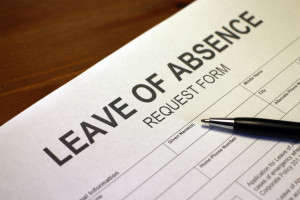What are Typical Company Policies about Leaves of Absence?
 Whether you need to take a few weeks off work or a few months, you need to know what employer requires of those taking a leave of absence. This refers to any period of time that you need or want to take off work. You might take time off after bringing home a new baby, adopting a child, receiving a medical diagnosis, to take care of a loved one or just to work on a business idea you have. Employers usually have different regulations regarding time off, but many share some similar policies.
Whether you need to take a few weeks off work or a few months, you need to know what employer requires of those taking a leave of absence. This refers to any period of time that you need or want to take off work. You might take time off after bringing home a new baby, adopting a child, receiving a medical diagnosis, to take care of a loved one or just to work on a business idea you have. Employers usually have different regulations regarding time off, but many share some similar policies.
Family Medical Leave Act
The Family and Medical Leave Act, also known as the FMLA, is a government act established in 1993 to help employees. This act gives workers the right to take up to 12 weeks off for medical and family issues. You can take time off after having a baby, while going through medical treatment and for similar situations. According to Jada A. Graves, a writer for U.S. News and World Report, not everyone is eligible to take time off under the FMLA. Graves points out that you must work at least 1,250 hours in the last 12 months to qualify.
Paid vs. Unpaid Leave
There is a difference between an unpaid leave and a paid leave. An unpaid leave is one in which you do not receive any money for the time you take off work. Though the FMLA states you can take 12 weeks off, you will not receive any money during that time period once any eligible vacation and sick pay is exhausted. With a paid leave, your employer agrees to pay you for your work.
Professors working on research projects may receive paid time off because the college knows that work with increase its reputation. If you have any paid time off on your record, your employer may require that you use that paid time off before taking your leave.
Giving Advanced Notice
Before you can take leave from work, you should give your employer notice of that action. Though you might give a company two weeks notice before leaving for a new job, you may not have as much time available during an emergency situation. It’s important that you inform your supervisors as soon as possible before taking any leave. You can write a letter or email to your direct supervisor and send a copy of that email to the human resource director of the company.
Providing Proof
Many employers now require that you provide some type of proof before taking a leave of absence. If you take time off work after adopting a child, you may need to submit paperwork that shows the date you brought the child home, and if you suffer from a medical condition, your employer may ask that your doctor write a note for you. Though the note should not state the exact condition you have, it should explain that you need to take a period of time off work to focus on yourself.
Some jobs allow workers to take a few weeks or more off work every year, but other jobs require that employees only take paid time off whenever possible. If you need to take a leave of absence, you should check with your employer regarding any rules or regulations you must follow, including giving advance notice or providing proof of why you need to take time off.